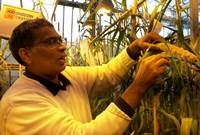Developing pearl millet to tackle diabetes

Dr Rattan Yadav
04 February 2015
Scientists at Aberystwyth University’s IBERS (Institute of Biological, Environmental and Rural Sciences) have been awarded £250,000 of Agri-Tech Catalyst funding for an 18 month project to develop new varieties of pearl millet.
Working with industrial partners, the project is worth a total of £500,000 and aims to develop low Glycemic Index (GI) varieties of the crop.
This will provide smallholder farmers in India with direct access to those foods, and speed up the development of new low GI products to address the massive global issue of diabetes.
Dr Rattan Yadav is leading the research at IBERS and said; “Globally the number of (type 2) mainly non-insulin dependent diabetics is 347 million, in India alone the number is currently estimated at 40 million and rising. In the UK it is estimated that 5 million people will have diabetes by 2025, and there is growing awareness of and publicity regarding how foods with a lower Glycemic Index (GI) can help in the fight against the disease.
“This awareness is now spreading to countries such as India as diabetes becomes more prevalent, thus creating a global market for products that can control blood glucose.”
This work will identify and characterise genetic variation present in pearl millet germplasm for enhanced starch qualities by applying cutting-edge genomics and chemical phenotyping of the grain’s constituents.
Availability of such information in the long run will lead to development of new varieties that have a lower GI and alleviate increasing insulin resistance.
Reducing the debilitating and costly effects of the rising incidence of diabetes is a challenge not only for India, but also for Western countries where diabetes and obesity continue to increase at an alarming rate.
The project will help to develop new pearl millet varieties using marker assisted selection in the genetic background of farmer-friendly and industry-preferred varieties.
More than 200 million of the world’s poorest and most nutritionally insecure people are dependent upon pearl millet as their main dietary staple. Pearl millet not only has a low GI but has the added advantage of being a crop well suited to the arid uplands that do not support rice or wheat and thus is a crop with excellent food security credentials.
By developing new varieties that are nutritionally improved in locally-adapted crops, but that are also designed for use in manufactured food products, it is estimated that over 3 million smallholders would benefit from trading their pearl millet as a higher value cash crop.
This latest research builds on the success of former collaborative research by Dr Yadav’s team at IBERS, including the development and release of a pearl millet variety bred through marker assisted selection (MAS) which is currently grown on more than 875,000 ha annually and provides smallholder farmers in India with an additional income of £7 million per year.
IBERS
The Institute of Biological, Environmental and Rural Sciences (IBERS) is an internationally recognised research and teaching centre providing a unique base for research in response to global challenges such as food security, bioenergy and sustainability, and the impacts of climate change. IBERS scientists conduct basic, strategic and applied research from genes and molecules to organisms and the environment.
IBERS receives strategic research funding of £10.5m from the BBSRC to support long term mission driven research, and is a member of the National Institutes of Bioscience. IBERS also benefits from financial support from the Welsh Government, DEFRA and the European Union.
AU5115



